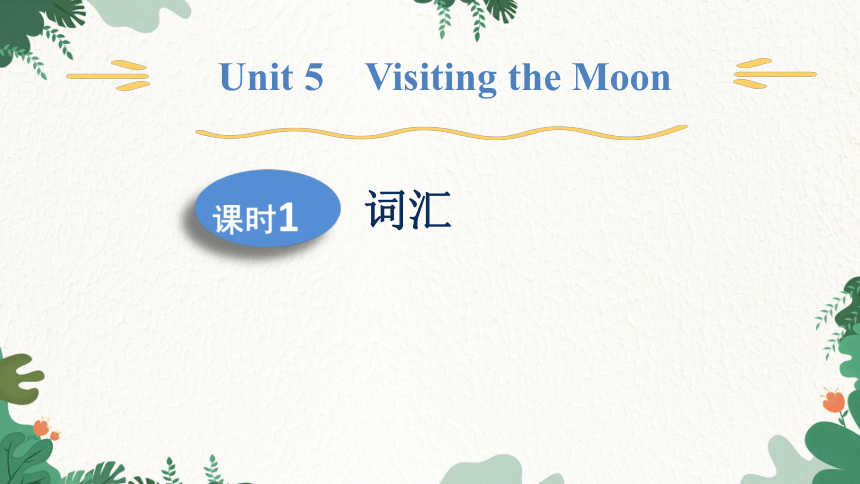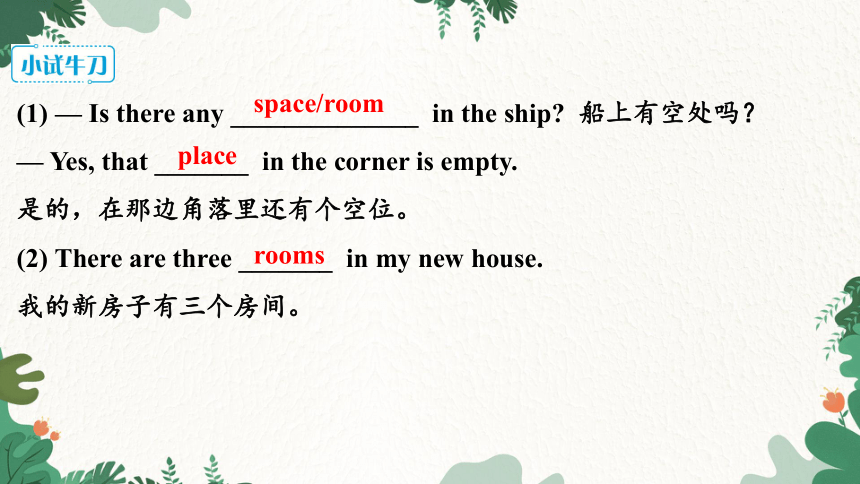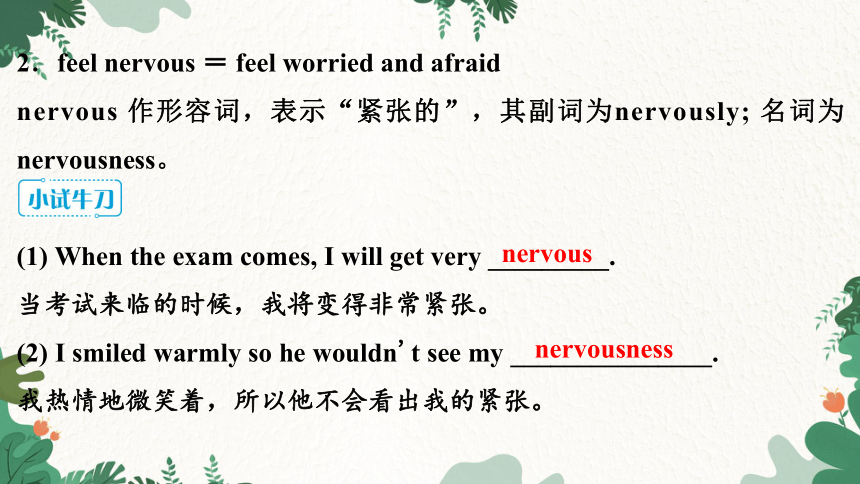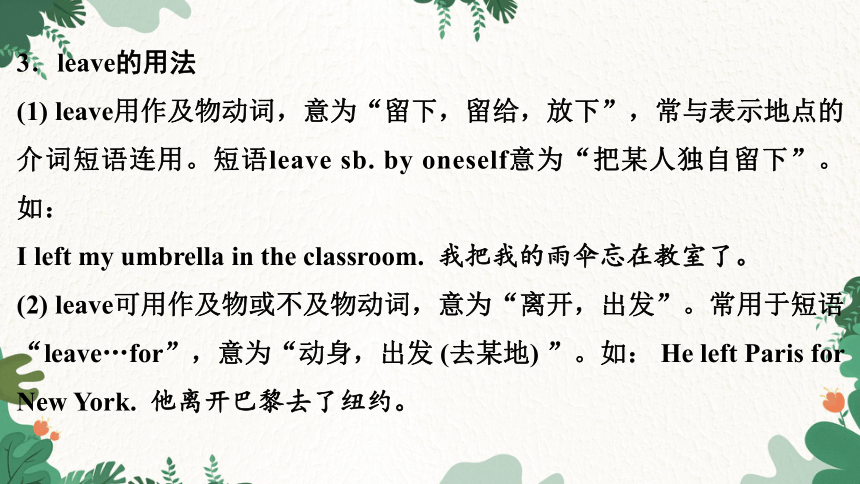牛津深圳版英语七年级上册 Unit 5 Visiting the moon 课时1 词汇课件(共19张PPT)
文档属性
| 名称 | 牛津深圳版英语七年级上册 Unit 5 Visiting the moon 课时1 词汇课件(共19张PPT) |

|
|
| 格式 | pptx | ||
| 文件大小 | 2.2MB | ||
| 资源类型 | 教案 | ||
| 版本资源 | 牛津深圳版 | ||
| 科目 | 英语 | ||
| 更新时间 | 2023-07-21 00:00:00 | ||
图片预览







文档简介
(共19张PPT)
Unit 5 Visiting the Moon
课时1
词汇
一
课时精讲
三
四基三级练
二
课时过关
重点词汇学习。
1.space, place, room的用法区别
(1) 泛指一般意义的“空地”或“空间”时,space 和 room 均可以用,但前者根据情况可用作可数或不可数名词,而后者通常只用作不可数名词。space表示“太空; 宇宙”时,是不可数名词,而room 表示“房间”时,是可数名词。
(2) place表示“空地”,其含义通常比较具体,且往往指“座位”,有时与seat同义。
(1) — Is there any ______________ in the ship 船上有空处吗?
— Yes, that _______ in the corner is empty.
是的,在那边角落里还有个空位。
(2) There are three _______ in my new house.
我的新房子有三个房间。
space/room
place
rooms
2.feel nervous = feel worried and afraid
nervous 作形容词,表示“紧张的”,其副词为nervously; 名词为nervousness。
(1) When the exam comes, I will get very _________.
当考试来临的时候,我将变得非常紧张。
(2) I smiled warmly so he wouldn't see my _______________.
我热情地微笑着,所以他不会看出我的紧张。
nervous
nervousness
3.leave的用法
(1) leave用作及物动词,意为“留下,留给,放下”,常与表示地点的介词短语连用。短语leave sb. by oneself意为“把某人独自留下”。如:
I left my umbrella in the classroom. 我把我的雨伞忘在教室了。
(2) leave可用作及物或不及物动词,意为“离开,出发”。常用于短语“leave…for”,意为“动身,出发 (去某地) ”。如: He left Paris for New York. 他离开巴黎去了纽约。
(3) leave属非延续性动词,它不能和表示一段时间的词连用,如果要表示离开一段时间,要用be away来代替。如:
I have been away for a week. 我离开一周了。
(4) leave用作名词时,可以表达多种含义,如“休假,假期,许可,同意”。如:
I had a two-week leave. 我请了两周假。
(1) I want to ________ the city ______ the countryside. 我想离开这座城市去乡下。
(2) Lily ______ home when she was five years old. 莉莉5岁的时候离开了家。
(3) I have got a cold, so I asked for a two-day ________ to relax myself.
我得了感冒,所以我请假休息两天放松自己。
leave
for
left
leave
4.can与be able to的用法
★can与be able to意为“能; 会”,两者后跟动词原形,即“can+动词原形”,“be able to+动词原形”。具体地说,can不随主语人称/数的变化而变化,只用于一般现在时和一般过去时,can过去式 could; be able to 随主语人称/数和时态变化而变化,且可用于各个时态。can和be able to在一般现在时、一般过去时中相等,即can = am/is/are able to, could = was/were able to。
(1) They ________________ arrive there on time. 他们能准时到那儿。
(2) He ____________________ run fast six years ago. 六年前他能够跑得很快。
(3) My aunt _________________ get to Hainan next week. 我阿姨下周能到达海南。
can/are able to
could/was able to
will be able to
5.tie的用法
tie作名词,意为“领带; 鞋带”; 还可意为“平局”; tie作动词,意为“用绳子系、拴或捆绑”。
(1) My father has a beautiful _____.
我爸爸有一条漂亮的领带。
(2) The match between the USA and England ended in a _____.
美国与英格兰那场比赛是平局。
(3) Please _____ the cow ____ the tree when you arrive home.
当你到家的时候,请把这头奶牛拴到树上。
tie
tie
tie
to
6.work的用法
(1) 表示“工作”, 是不可数名词,相当于job,但job是可数名词。如:
He has too much work to do. 他要做的工作太多。
(2) 用作动词,表示“工作,运转,运行”。如:
My father works in that factory. 我父亲在那家工厂工作。
(3) 表示“著作”或“作品”,是可数名词, 但多用复数。如:
The man gained his wealth by printing works of famous writers.
这个男人靠印刷著名作家的著作发了财。
(4) 表示“工厂”,只用复数形式, 但可表示单数意义。如:
The glass works is/are near the station. 玻璃工厂在车站附近。
【拓展】注意以下各名词变为复数形式, 而导致含义有变化:
green 绿色—greens 青菜; 蔬菜 wood 木头; 木材—woods 小树林
manner 方式; 方法—manners 礼貌 arm 臂—arms 武器
water 水—waters 河川; 海 spirit 精神—spirits 心境
quarter 四分之一—quarters 营房; 住处 custom 习惯—customs 关税
force 力气—forces 军队
( ) — Where does Mr. Smith work
— He works in a glass around here.
A.work
B.works
C.working
B
一、按要求写出下列单词的相应形式。
1.diary (复数) _________ 2.nervous (副词) ___________
3.tie (现在分词) _______ 4.leave (过去式) ______
5.garden (指人的名词) __________ 6.we (反身代词) ___________
7.photo (复数) ________ 8.breathe (名词) ________
diaries
nervously
tying
left
gardener
ourselves
photos
breath
二、填入恰当的实词或虚词,或用所给单词的适当形式完成句子。
1.We should learn how to look after ___________ (our) when we leave home.
2.You can do the work without ___________ (leave) your home.
3.There are hundreds _______ rocks on this mountain.
4.I really love taking ___________ (photo) during my trip.
5.He will spend one day____________ (return) to Beijing.
ourselves
leaving
of
photos
returning
6.Where is the best place _____________ (watch) stars in our school
7.It'll take us more than 12 hours _________ (fly) to New York.
8.I'd like the house with a ___________ (swim) pool and a big garden.
9.It was ______ big success to hold the parents' meeting in our class.
10.I'm ___________ (excite) about the interesting movie.
to watch
to fly
swimming
a
excited
谢谢大家!
Unit 5 Visiting the Moon
课时1
词汇
一
课时精讲
三
四基三级练
二
课时过关
重点词汇学习。
1.space, place, room的用法区别
(1) 泛指一般意义的“空地”或“空间”时,space 和 room 均可以用,但前者根据情况可用作可数或不可数名词,而后者通常只用作不可数名词。space表示“太空; 宇宙”时,是不可数名词,而room 表示“房间”时,是可数名词。
(2) place表示“空地”,其含义通常比较具体,且往往指“座位”,有时与seat同义。
(1) — Is there any ______________ in the ship 船上有空处吗?
— Yes, that _______ in the corner is empty.
是的,在那边角落里还有个空位。
(2) There are three _______ in my new house.
我的新房子有三个房间。
space/room
place
rooms
2.feel nervous = feel worried and afraid
nervous 作形容词,表示“紧张的”,其副词为nervously; 名词为nervousness。
(1) When the exam comes, I will get very _________.
当考试来临的时候,我将变得非常紧张。
(2) I smiled warmly so he wouldn't see my _______________.
我热情地微笑着,所以他不会看出我的紧张。
nervous
nervousness
3.leave的用法
(1) leave用作及物动词,意为“留下,留给,放下”,常与表示地点的介词短语连用。短语leave sb. by oneself意为“把某人独自留下”。如:
I left my umbrella in the classroom. 我把我的雨伞忘在教室了。
(2) leave可用作及物或不及物动词,意为“离开,出发”。常用于短语“leave…for”,意为“动身,出发 (去某地) ”。如: He left Paris for New York. 他离开巴黎去了纽约。
(3) leave属非延续性动词,它不能和表示一段时间的词连用,如果要表示离开一段时间,要用be away来代替。如:
I have been away for a week. 我离开一周了。
(4) leave用作名词时,可以表达多种含义,如“休假,假期,许可,同意”。如:
I had a two-week leave. 我请了两周假。
(1) I want to ________ the city ______ the countryside. 我想离开这座城市去乡下。
(2) Lily ______ home when she was five years old. 莉莉5岁的时候离开了家。
(3) I have got a cold, so I asked for a two-day ________ to relax myself.
我得了感冒,所以我请假休息两天放松自己。
leave
for
left
leave
4.can与be able to的用法
★can与be able to意为“能; 会”,两者后跟动词原形,即“can+动词原形”,“be able to+动词原形”。具体地说,can不随主语人称/数的变化而变化,只用于一般现在时和一般过去时,can过去式 could; be able to 随主语人称/数和时态变化而变化,且可用于各个时态。can和be able to在一般现在时、一般过去时中相等,即can = am/is/are able to, could = was/were able to。
(1) They ________________ arrive there on time. 他们能准时到那儿。
(2) He ____________________ run fast six years ago. 六年前他能够跑得很快。
(3) My aunt _________________ get to Hainan next week. 我阿姨下周能到达海南。
can/are able to
could/was able to
will be able to
5.tie的用法
tie作名词,意为“领带; 鞋带”; 还可意为“平局”; tie作动词,意为“用绳子系、拴或捆绑”。
(1) My father has a beautiful _____.
我爸爸有一条漂亮的领带。
(2) The match between the USA and England ended in a _____.
美国与英格兰那场比赛是平局。
(3) Please _____ the cow ____ the tree when you arrive home.
当你到家的时候,请把这头奶牛拴到树上。
tie
tie
tie
to
6.work的用法
(1) 表示“工作”, 是不可数名词,相当于job,但job是可数名词。如:
He has too much work to do. 他要做的工作太多。
(2) 用作动词,表示“工作,运转,运行”。如:
My father works in that factory. 我父亲在那家工厂工作。
(3) 表示“著作”或“作品”,是可数名词, 但多用复数。如:
The man gained his wealth by printing works of famous writers.
这个男人靠印刷著名作家的著作发了财。
(4) 表示“工厂”,只用复数形式, 但可表示单数意义。如:
The glass works is/are near the station. 玻璃工厂在车站附近。
【拓展】注意以下各名词变为复数形式, 而导致含义有变化:
green 绿色—greens 青菜; 蔬菜 wood 木头; 木材—woods 小树林
manner 方式; 方法—manners 礼貌 arm 臂—arms 武器
water 水—waters 河川; 海 spirit 精神—spirits 心境
quarter 四分之一—quarters 营房; 住处 custom 习惯—customs 关税
force 力气—forces 军队
( ) — Where does Mr. Smith work
— He works in a glass around here.
A.work
B.works
C.working
B
一、按要求写出下列单词的相应形式。
1.diary (复数) _________ 2.nervous (副词) ___________
3.tie (现在分词) _______ 4.leave (过去式) ______
5.garden (指人的名词) __________ 6.we (反身代词) ___________
7.photo (复数) ________ 8.breathe (名词) ________
diaries
nervously
tying
left
gardener
ourselves
photos
breath
二、填入恰当的实词或虚词,或用所给单词的适当形式完成句子。
1.We should learn how to look after ___________ (our) when we leave home.
2.You can do the work without ___________ (leave) your home.
3.There are hundreds _______ rocks on this mountain.
4.I really love taking ___________ (photo) during my trip.
5.He will spend one day____________ (return) to Beijing.
ourselves
leaving
of
photos
returning
6.Where is the best place _____________ (watch) stars in our school
7.It'll take us more than 12 hours _________ (fly) to New York.
8.I'd like the house with a ___________ (swim) pool and a big garden.
9.It was ______ big success to hold the parents' meeting in our class.
10.I'm ___________ (excite) about the interesting movie.
to watch
to fly
swimming
a
excited
谢谢大家!
